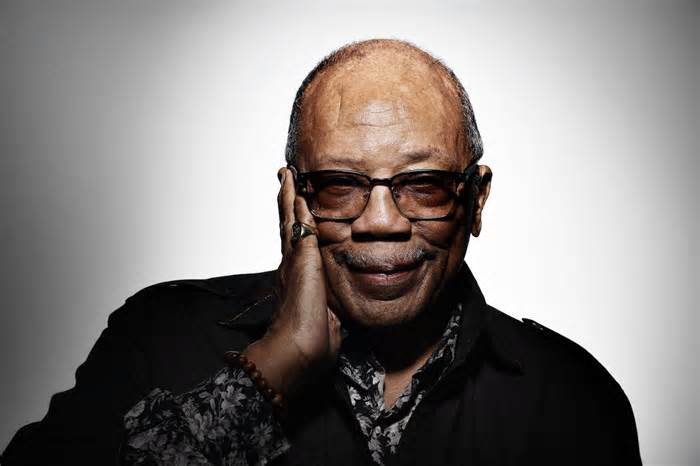
What Donald Trump could learn from Quincy Jones
- by The Boston Globe
- Nov 10, 2024
- 0 Comments
- 0 Likes Flag 0 Of 5

A portrait of record producer Quincy Jones from 2016. Jones died last Sunday at 91.
With news of the Nov. 3 death of Quincy Jones at age 91 came the obligatory flood of clips on social media highlighting a career that is unparalleled in pop music history.
In videos, Jones talked about producing and collaborating with such stars as Dinah Washington, Frank Sinatra, Queen Latifah, Dizzy Gillespie, Gloria Estefan, Count Basie, Sarah Vaughan, Chaka Khan, and, of course, Michael Jackson. Jones produced the three defining albums that solidified Jackson as an icon â âOff the Wall,â âThriller,â and âBad.â
Long before Jones met Jackson, he studied in Paris with Nadia Boulanger, considered one of the preeminent teachers of composition. Jones said the woman who also taught Leonard Bernstein and Philip Glass helped him sharpen his musical skills and gave him what he called âthe best advice I ever got.â
Advertisement
âShe said, âYour music will never be more or less than you are [as] a human being,ââ Jones said in an unidentified clip. âSo I started to work on the human being.â Jones, then 85, said he wanted to âget all of the negative thoughts out of my body.â That included his grudges and anger, which he called âa waste of time.â
Jones offered a quote variously attributed to Seneca, Mahatma Gandhi, and Mark Twain, among others, to illustrate his point: âAnger is an acid which does more harm to the vessel in which it is stored than anything on which it is poured.â
In the devastating aftermath of Tuesdayâs presidential election, I keep thinking about the corrosive impact of anger and the man who spent years vowing retribution against his perceived enemies if he became president again.
As Donald Trump prepares for his second term in the White House, he could learn a lot from Jonesâs words about letting go of anger to be both a better person and a more compassionate leader.
But then that wouldnât be Trump, nor would it be the man that more than 72 million Americans elected again. They know exactly who they voted for.
Less than 24 hours after Trumpâs win, Karoline Leavitt, his national press secretary, said in a Fox News interview that Trump will launch âmass deportationsâ of undocumented immigrants, which will cause unprecedented chaos nationwide. And thatâs just the beginning of the ways that Trump will deepen divisions and turn this country inside out.
Advertisement
In a wild 2018 interview with New York magazine that found Jones at his tea-spilling best, he talked about Trump and described him as âa megalomaniac,â a ânarcissist,â and quite a few other things that canât be repeated here.
But months later, at the premiere of âQuincy,â a Netflix documentary codirected by his daughter, actress Rashida Jones, Jones mentioned Trump in a more conciliatory tone.
âYou canât afford to get angry, man,â he told an interviewer. âI said that to myself when Donald Trump won. Are you happy with our president? Weâll live through it. Weâll learn.â
Given Trumpâs decisive victory, it would appear that this nation has learned nothing, and millions seem to have adapted the president-electâs tireless predilection for division and rancor. Iâm not sure that many are prepared for what weâll probably have to live through â and with â for the next four years.
One thing we can do is find solace through music. Most know the adage about music being a universal language with an innate ability to bridge our differences. Jones understood this, and he made music the way most people listen to it â without walls. He was genre-agnostic, as comfortable working as a trumpeter with jazz vibraphonist Lionel Hampton as he was writing a swinging new arrangement for what became âFly Me to the Moon,â a Sinatra classic.
In 1985, he gathered more than 40 of the worldâs biggest artists â including Jackson, Tina Turner, Bruce Springsteen, Bob Dylan, and Stevie Wonder â to record the charity single âWe Are the World,â which raised more than $63 million for famine relief. As artists arrived at the recording studio, they were greeted by a sign: âCheck your egos at the door.â
Advertisement
In âQ,â his 2001 autobiography, Jones, who described ego as âoverdressed insecurity,â said he wanted the sign to remind the performers that âthis project was bigger than all of us.â
Come January and for the next four years, this nation will need to remind itself again and again that itâs bigger than the destructive whims of one manâs anger and overdressed insecurities.
Renée Graham is a Globe columnist. She can be reached at renee.graham@globe.com. Follow her @reneeygraham.
Globe Opinion
Please first to comment
Related Post
Stay Connected
Tweets by elonmuskTo get the latest tweets please make sure you are logged in on X on this browser.
Sponsored
Popular Post
Tesla: Buy This Dip, Energy Growth And Margin Recovery Are Vastly Underappreciated
28 ViewsJul 29 ,2024







 Energy
Energy

















